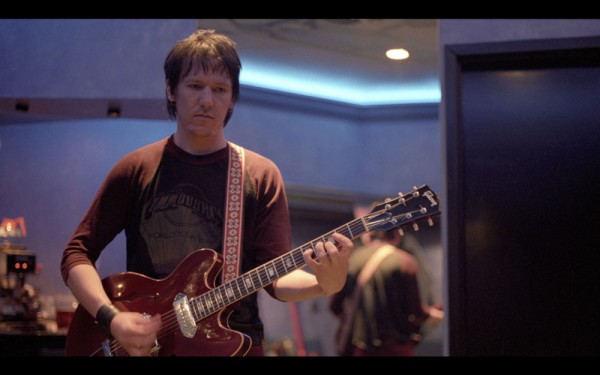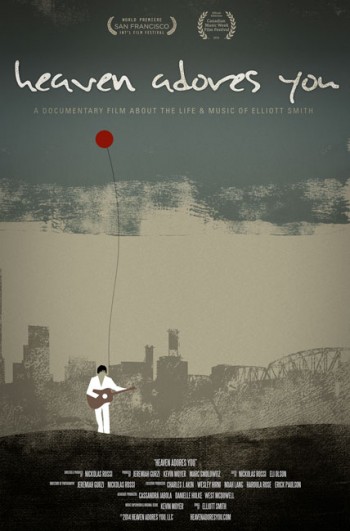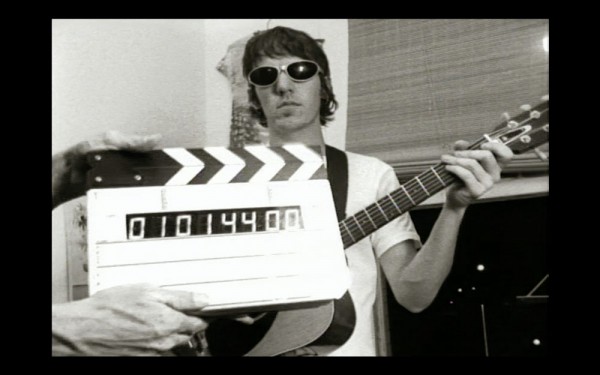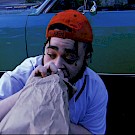 Photo by Heaven Adores You
Photo by Heaven Adores You
Along with director Nickolas Rossi, the new Elliott Smith documentary Heaven Adores You is largely the work of Portland producer and music supervisor Kevin Moyer, who generously answered a few questions about the film. Largely funded by a Kickstarter campaign, the documentary has been several years in the making. It’s currently playing the film festival circuit and should be scheduled for a Portland screening “any day now,” according to Moyer.
How has the response been to Heaven Adores You up to this point?
It’s been really great. The three screenings we had in San Francisco sold out and there was a line down the block. Some people couldn't get in. So there’s definitely big interest! The people watching it have loved it. People silent and just watching, some crying—and also people laughing too, which I think Elliott would have appreciated. Lots of fans approached me at the after-party that we had at the Bottom of the Hill (where Elliott performed often) and really seemed affected by it—in a good way. It's been really positive so far. Someone said it was like a video version of Autumn [de Wilde’s] book Elliott Smith, which I think is a huge compliment.
The title Heaven Adores You comes from a song from the band Earlimart [below], which was written about Elliott, and who were friends with him during his time in L.A. There will be a Portland premiere—we are working on this as we speak.
What was it that inspired you to take on this project?
I remember, 25-plus years ago, meeting Elliott Smith for the first time at the bus stop in front of the high school that we both went to in downtown Portland.
I remember, 10 years after that, our friends having viewing parties when one of his songs was nominated for an Oscar and he was asked to perform at the Academy Awards—"One of us is on the moon!" someone shouted.
And I still remember, almost like it was yesterday, five years later when I was driving in a sudden rainstorm and had to pull over to cry because the radio had just told me that he had died at the young age of 34 from a stab wound to the heart.
 Elliott Smith had a knack for making you feel super connected and really understood, no matter how fleeting the time was that you might have spent together, or how much time would span in between such meetings, and he left a lasting and positive impression that I still carry with me today and has made me a better human being. I think fans of his music feel the same connection. He could connect with your heart and mind through your ears and he could make the ugliest stories beautiful with his lyrics and melodies.
Elliott Smith had a knack for making you feel super connected and really understood, no matter how fleeting the time was that you might have spent together, or how much time would span in between such meetings, and he left a lasting and positive impression that I still carry with me today and has made me a better human being. I think fans of his music feel the same connection. He could connect with your heart and mind through your ears and he could make the ugliest stories beautiful with his lyrics and melodies.
His sudden and tragic absence broke my heart, and for years it was hard to communicate exactly how much Elliott Smith meant to me. I didn’t know how to tell others when it would eventually come up—and it would because the Portland music community is a tight-knit group and I would also later release some of his music on my LFNNY effort. It would be hard to explain without getting too esoteric or emotional, and it often also felt silly and like emotions that no one else could possibly understand unless they were already feeling the same.
So, for the past few years I have been working with Nickolas Ross and JT Gurzi to put something together to hopefully communicate what I never could have said on my own.
This project is a love letter to Elliott and his music. It’s a love letter to Portland too—as well as Texas, New York and Los Angeles, which are the other places that Elliott called home.
And most importantly, it’s a love letter from a whole bunch of other great people who were close to Elliott and loved him just as much too—friends and family who graciously trusted us with such a sensitive subject and put their own vulnerabilities aside to help us explain to the world why we all loved him.
It has been an emotional and intense journey, commiserating and confiding in each other and all who have shared with us, constantly scraping personal wounds that may never heal, in an open effort to feel better and give proper tribute to a friend and amazing musician.
Do you feel you've come to understand Elliott after all the research? Or is he still a mystery?
He was so many different things to so many different people. He had layers and different angles that you would see depending on how you knew him and what your relationship with him might be and what he might decide to show you. One thing that I think we can all agree on though was that he was incredibly talented and a very compassionate person. And everyone we talked to loved him immensely, no matter how their relationship with him might have ended.
What surprised you the most about the process of making the film?
The biggest surprise was that we were able to do it at all. It’s a very tough conversation for almost everyone who knew him and people are very hesitant to publically share because there have been many projects done for the wrong reasons. When we started this project everyone told me it was impossible, and at times it felt that way, because exploitive and hurtful things had been done in the past and people felt burned or at their limit, so Portland was kind of closed to talking about him to people on the outside. But I appealed to mutual friends to help us explain why we all loved him so much and I think their trust was essential because without them we would have nothing. One of the first conversations that I had was with friend and archivist Larry Crane whom I promised that if the project turned out to be something that he disagreed with, I promised him that he could punch me square in the face with no struggle or complaint from me.
And then I just appealed to people to let their guard down and speak from the heart, and they showed a huge amount of trust and vulnerability in doing so, and it was done out of love and tribute. Just the fact that this project was coming from within his own inner circle was something that hugely differentiated the project from many of the others—and when its being done by friends and with friends, and when you are doing things for the right reasons and in the right ways, then things open up to you. But it was not an easy process navigating all of the different sensitivities, but everyone has said that they were glad they did it.
 Photo by Ross Harris
Photo by Ross Harris
Any new developments on the Elliott Smith front? Any new music?
We have received permission to use an extensive list of his own music in an effort to let Elliott speak for himself through his own body of art. We have included songs that fans love, we have included songs that people have never heard, and we have included songs that can never be heard enough. We also have included personal pictures and live footage dug out from forgotten boxes in the attics of friends, and we have captured the stories and memories of his life and music career as told by those who knew him best. So hopefully this project will get a lot of new stuff out there for the hard-core fans to enjoy, as well as also being something accessible to people who are not already familiar so that we might bring in some new fans as well.
What was your goal when you began the project and do you think you've accomplished it?
The project was originally a fan film about other musicians inspired by Elliott, but when I joined the effort we changed the focus to be about him specifically—I invited my project partners Nickolas and JT into Elliott’s inner circle, introduced them to his friends and collaborators, and convinced them to trust us. So it went from a fan film about his influence to being a film about him and his own influences instead and the mark that he left on us all. So the initial goal with those two guys was very different than the one that it became once I began, but at the same time I think the goal of all of us was always to tell people about Elliott Smith and the beautiful music that he left us.
Once the parameters changed, my goal was to do right by him and his legacy while also doing right by the friends whom I convinced to trust us. Many extremely hard conversations were had in an effort to make sure that everything was done the right way and for the right reasons.
Also to keep his music out there in the world, in a way to keep him alive and to keep him still with us. Nothing can bring him back, no matter what you believe about how his life ended or who you blame, it doesn’t change anything in that he isn’t coming back and that breaks my heart. So the important thing is to take the beautiful things that he put out into the world while he was with us—his songs and his art and the impact he had on us all—and to keep those beautiful things alive and out there in the world so that he can still live on and be felt even in absence.
Full disclosure: This reporter is one of the talking heads featured in this film.




